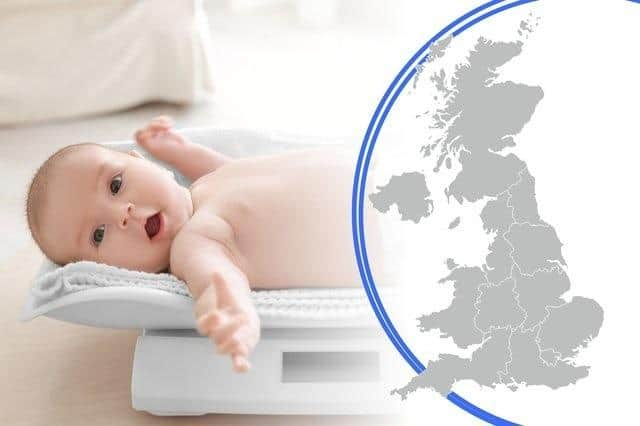Women in Milton Keynes eight times more likely to have bigger babies than other parts of the UK
and live on Freeview channel 276
A range of factors can influence the likelihood of having an unusually large baby, including a mother’s weight and age, genetics, gestational diabetes, and a baby being overdue.
In some parts of England babies are up to four times more likely than others to be larger than usual, while in Scotland the worst affected areas see babies twice as likely than the national average to weigh in over the medically large baby threshold.
Advertisement
Advertisement
Babies are considered unusually large if they weigh at least 8lb 13oz, or four kilograms – the equivalent of four bags of sugar. The medical term is foetal macrosomia.


Babies this size can lead to complications during labour, and mothers are more likely to need a caesarian section.
NationalWorld’s analysis of data from health bodies across the UK nations shows between one in seven and one in 10 babies have macrosomia, with those in Northern Ireland most likely to be on the chunkier side.
Office for National Statistics (ONS) data shows one in 10 babies in England are unusually large.
Advertisement
Advertisement
Of 569,314 live births with weights recorded in 2020, 57,753 babies (10.1%) tipped the scales at four kilograms or more, with 596 of those weighing in at an incredible five kilograms, or 11lb.
At a regional level, women in the South West were most likely to have large babies, with 11.9% weighing at least four kilograms, followed by women in the South East, at 11.5%.
In the Midlands the crown for England’s biggest babies goes to Rugby where, a whopping 25.6% of babies weighed in at four kilograms, while 2.3% were five kilograms or more.
In Milton Keynes a total of 2,560 babies were born in 2021 (excluding May due to missing data); of those
> Babies with known birth weight: 185
> Babies weighing 4kg or more: 40
> Proportion of babies weighing 4kg or more: 21.6%
Advertisement
Advertisement
In recent decades the average baby born in England and Wales has become heavier, according to a 2018 study published in the British Medical Journal.
Some anti-obesity campaigners have warned that unusually big babies are becoming increasingly common due to a rise in obesity among pregnant women.
But despite this, data shows there has been no increased likelihood of newborns weighing four kilograms or more during the last decade across each UK nation.
In England, the proportion of super-sized babies has fallen from 11.4% in 2010 to 10.1% in 2020, the ONS data shows.
Advertisement
Advertisement
In Wales, prevalence is down slightly from 12.1% to 11.9% over the same period, reaching a peak of 12.2% in 2014.
The proportion of babies weighing four kilograms in Scotland fell from 14.1% in the year ending March 2011 to 13.3% in the year ending March 2021 – although there was an increase in the last year.
And in Northern Ireland, prevalence is down from 15.1% in 2010-11 to 13.8% to 2018-19.
Professor Asma Khalil, spokesperson for the Royal College of Obstetricians and Gynaecologists, said: “While there is an increased risk of complications if a baby is four kilograms, the majority of women do not have any complications and their baby is born safely without any problems.”